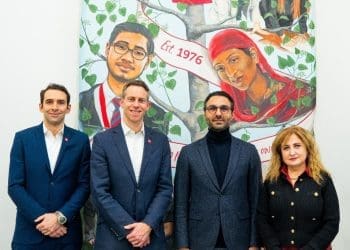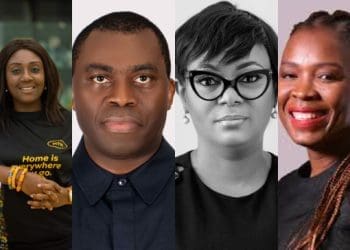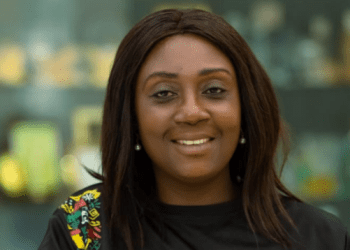The MTN Ghana Foundation has reaffirmed its commitment to digital inclusion and women’s empowerment through the 2025 edition of the Girls Code Hackathon.
Organized in collaboration with Absa Bank, the event brought together young women from tertiary institutions across the country to design innovative technology solutions addressing real-world challenges.
Speaking at the 30-hour hackathon, Senior Manager for the MTN Ghana Foundation, Robert Kuzoe, said the programme reflects MTN’s broader mission to equip young women with the technical and soft skills necessary to excel in today’s rapidly evolving digital landscape.
“Today’s programme is something we do every year. We bring together young women from tertiary institutions — a couple of hundred girls — for a hackathon that challenges their minds and creativity,
The goal is to empower them with digital skills, particularly in coding, cybersecurity, and artificial intelligence.” he said.
He explained that the hackathon encourages participants to identify pressing social and business problems in their communities and to develop technology-driven solutions to address them.

“The best group that presents a practical and impactful innovation will be rewarded by MTN,” he noted.
He added that the initiative aligns with one of the Foundation’s key pillars ; inclusion, with a strong focus on gender equality and empowering women to succeed in male-dominated fields.
“This falls under our inclusion pillar. We are passionate about helping women break new ground in industries traditionally dominated by men,” he said.
Robert Kuzo described this year’s edition as unique because it focuses exclusively on tertiary-level participants, who are expected to deliver more advanced and refined ideas.
“This year, we have 100 young women from tertiary institutions, which makes the event special. We’re expecting their innovations to go a step further than what we’ve seen in previous years,” he added.
Looking beyond the competition, Robert Kuzo emphasized that the Foundation’s long-term vision is to promote digital empowerment and employability among young people.
“Our goal is to empower the youth with skills that make them employable or self-reliant, rather than depending solely on white-collar jobs. For those passionate about engineering and technology, MTN can be a place of opportunity — if they make the most of this platform,” he said.
He commended the participants for their enthusiasm and urged them to remain focused and determined throughout the challenge.
“They are doing something right. They should stay focused, keep pushing, and may the best team win,” he concluded.
Head of Technology and Service Management at Absa Bank Ghana, Anita Twum-Ampofo, encouraged young women in technology to develop innovative, inclusive, and secure digital solutions that respond to the needs of ordinary Africans.
Speaking under the theme “Future-Proofing Africa: Innovation at the Intersection of Fintech, Cybersecurity, and AI,” she noted the importance of using technology as a force for inclusion, empowerment, and ethical transformation.
“Over the next 30 hours, you’ll not only build solutions but also build legacies,
As we digitize our economies, we must secure them. As we innovate, we must ensure inclusion. And as we embrace AI, we must do so ethically and intentionally.” She said.
She stressed that Africa’s young population and rapidly growing digital economy present immense opportunities, but also responsibilities to ensure trust and inclusion in technology.
“Cybersecurity is no longer a back-office function; it’s a frontline necessity. Every line of code you write, every API you connect, every interface you design must be trustworthy — because without trust, technology fails,” she explained.
She also reminded participants that Artificial Intelligence (AI) should serve as a tool for empowerment rather than a replacement for human creativity.
“You belong here — not just in this hackathon, but in boardrooms, policy tables, and innovation labs. You are not only the future, you are the now,” she declared.
CEO and Founder of Girls Code, Zandile Mkwanazi, outlined the main judging criteria for the competition, noting that teams would be assessed based on four key areas — innovation activity, technical execution, impact and usefulness, and presentation or demonstration.
“We have these main things that we are going to use to judge. We have innovation activity on the score of 1 to 10, technical execution, impact and usefulness, and then presentation and demo. These are the main criteria we’ll use to judge,” she explained.

In a light-hearted moment, she promised participants that all judging documents would be made available in an eco-friendly way.
“Don’t worry — at the end, I’ll make sure everything is printed or scanned. We’ll be environmentally friendly,” she said.
She noted that the most valuable takeaway from the hackathon was not just the competition itself but the knowledge participants would gain.
“This Skills Academy aims to bridge the gap between the high demand for digital skills and the low supply while increasing employment opportunities. It’s not only in Ghana; it runs across Africa,” she noted, encouraging all participants to sign up on their phones immediately.
After an intense 30-hour coding challenge, LockedIn emerged as the overall winner of the competition, while Real Woman and A Connect took second and third place respectively.
Each member of the winning teams received a tablet, keyboard, wireless mouse, headset, and a book as part of their prizes.













